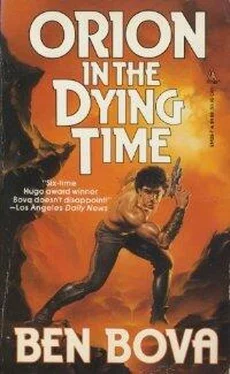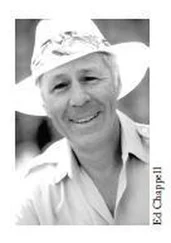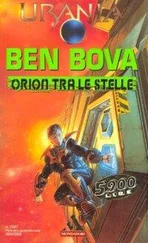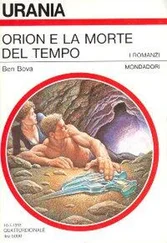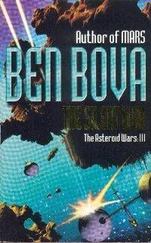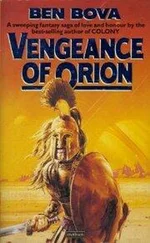Ben Bova - Orion in the Dying Time
Здесь есть возможность читать онлайн «Ben Bova - Orion in the Dying Time» весь текст электронной книги совершенно бесплатно (целиком полную версию без сокращений). В некоторых случаях можно слушать аудио, скачать через торрент в формате fb2 и присутствует краткое содержание. Год выпуска: 1990, ISBN: 1990, Издательство: Tor Books, Жанр: Фантастика и фэнтези, на английском языке. Описание произведения, (предисловие) а так же отзывы посетителей доступны на портале библиотеки ЛибКат.
- Название:Orion in the Dying Time
- Автор:
- Издательство:Tor Books
- Жанр:
- Год:1990
- ISBN:0-312-93111-5
- Рейтинг книги:4 / 5. Голосов: 1
-
Избранное:Добавить в избранное
- Отзывы:
-
Ваша оценка:
- 80
- 1
- 2
- 3
- 4
- 5
Orion in the Dying Time: краткое содержание, описание и аннотация
Предлагаем к чтению аннотацию, описание, краткое содержание или предисловие (зависит от того, что написал сам автор книги «Orion in the Dying Time»). Если вы не нашли необходимую информацию о книге — напишите в комментариях, мы постараемся отыскать её.
Orion in the Dying Time — читать онлайн бесплатно полную книгу (весь текст) целиком
Ниже представлен текст книги, разбитый по страницам. Система сохранения места последней прочитанной страницы, позволяет с удобством читать онлайн бесплатно книгу «Orion in the Dying Time», без необходимости каждый раз заново искать на чём Вы остановились. Поставьте закладку, и сможете в любой момент перейти на страницу, на которой закончили чтение.
Интервал:
Закладка:
This meant that Set and the other patriarchs that we met at each city must have been considerably older than the others around them. How old was Set? I began to wonder. Centuries, at least. Perhaps millennia.
Newly hatched Shaydanians inherited all the physical characteristics of their parents—including not merely brain structure, but the ability to communicate telepathically. Eons earlier, this trait must have arisen as a mutation, and then was passed on to the following generations. Telepathic individuals lived longer and produced more offspring, who were also telepathic. As the generations went by, the telepaths drove their less-talented brethren into extinction. Perhaps they did it by violence, just as the Creators once drove the Neanderthals into oblivion, almost.
Telepathic communication led the way to intelligence. While laying her eggs, a Shaydanian mother imprinted her unformed offspring with all the experiences of her life. Each generation of telepathic reptile imparted all the knowledge of every previous generation to its young. Once a new hatchling could learn, in the egg, all the experiences that every generation of its ancestors had lived through, it was armed mentally as well as physically to deal with the world around it.
The civilization that these intelligent reptilians built on Shaydan had existed for millions of terrestrial years. Each community was led by its eldest member. Their ages ran to thousands of years. To creatures who could open their minds completely to one another, distrust was unknown. Disagreements between individuals were decided by the patriarch—indeed, that seemed to be his main reason for existence.
Each community worked with the tireless self-effacing efficiency of an ant’s nest or a beehive. There were no wars because each community lived within the bounds of its environment. The children of Shaydan lived in harmony.
Until they realized that their star, Sheol, would one day destroy them.
The patriarchs consulted among themselves about how to face this dreadful certainty. Most of them felt that doom was inevitable and the only thing that could be done was to accept the fact. A few even recommended suicide, insisting it was better to die with dignity at one’s own choosing rather than wait for the cataclysm to strike them down.
Yet the urge to live was strong among them. They began to dig in, to extend their cities and dwellings underground in the hope that the bulk of their planet would help to protect them from the worst of the radiation that Sheol would one day rain upon the surface of Shaydan. Even so, they knew that the lethal radiation would be merely the first stage of Sheol’s death throes. Ultimately the star would explode and destroy their world along with itself.
Of all the patriarchs of Shaydan, only Set stood against the counsels of passivity and acceptance. He alone searched for a path to avert the doom that faced Shaydan. He alone determined to find a way to save himself, his people, his entire race. The other patriarchs thought him mad, at first, or supremely foolish to spend his remaining centuries trying to escape the inevitable. Set ignored them all.
Now, more than a century after he first started out to do it, he was exhibiting me to his fellow patriarchs as proof that they could migrate to Earth and begin life anew beneath the warmth of the stable life-giving yellow Sun.
I had no way of calculating how long we spent traveling from city to city. There was no way to count days, and there did not seem to be any noticeable seasons on Shaydan. Whenever I was permitted a glimpse into one of the reptilians’ minds and tried to ferret out such information, I could not understand how they reckoned time.
It occurred to me that the telepathic abilities of the Shaydanians must have a limited range. Otherwise why would Set go to the trouble and time of our planet-girdling travels? Why not remain comfortably in his own city and converse with the other patriarchs telepathically? Alternatively, if he found it necessary to exhibit me physically to each of the patriarchs, that meant that telepathic communication could not perform such a function. They had to see me in person.
Either way, it meant that there were limits even to Set’s formidable mental powers. I stored that hope away for future use; there was little other hope for me to cling to.
Now and then on our travels I thought I felt the ground tremble. More than once I heard a low rumbling reverberation like the growl of distant thunder. Neither Set nor his servants appeared to take any note of it, although our mounts seemed to hesitate and sniff the air worriedly.
In the middle of one of our audiences the ground did shake. The stone floor beneath me heaved, knocking me to my knees. A crack zigzagged in the wall behind the patriarch’s dais. He clutched the arms of his wide chair, hissing in a sibilant note I had never heard before. Even Set staggered slightly, and as I looked around I saw that the onlookers gathered on either side of the long chamber were clinging to one another and glancing around fearfully.
For the first time I heard the telepathic voices of many Shaydanians, clear and unshielded.
“The ground quakes again!”
“Our time grows short.”
“Sheol reaches out to seize us!”
Like a thunderbolt it struck me that the violent upheavals churning deep in the heart of the star Sheol were causing pulsations within the core of its planet Shaydan.
Our time grows short , one of the reptilians had gasped. But if Set and the patriarch felt that way, they gave no outward sign of it. Once the dust raised by the brief tremble had settled, Set unceremoniously yanked me to my feet and resumed his silent conversation with the olive-scaled patriarch seated before him.
Not before I finally learned what a truly horrible monster Set was. With so many minds open to me simultaneously, even if only for a few seconds, I learned that Set and his fellow patriarchs ruled their smaller fellows with a despicable iron despotism, a remorseless tyranny woven inextricably into the very genes of their people.
I realized in that horrifying flash of mental communication that almost everything Set had told me had been a distortion, a perversion of the truth. He was the prince of lies.
I had long wondered why not one of the people in any of the cities we had visited were anywhere near the size of Set and the other patriarchs. At first I had thought that this meant none of them were of patriarchal age. But why not? There should have been just as many reptilians hatched in his generation as these later ones. What had happened to Set’s generation? Were they all dead?
In that brief glimpse into the minds of so many Shaydanians inspired by the quake, I saw the sickening answer to my question. Set and his fellow patriarchs were the winners of a devastating war that had nearly destroyed all of Shaydan a thousand years before they learned that Sheol would explode. For Set himself had discovered the way to clone his cells, to make copies of himself, to do away with the need for breeding, for laying eggs, to do away with the female of his species completely.
Even worse, he had learned how to configure his cloned replicas to suit his own desires: how to limit their intelligence so that they would never challenge him, how to limit their life spans so they would never grow to his age and experience.
Swiftly, with cold ruthlessness, Set gathered about himself a merciless cadre of males his own age, offering them domination of their entire world for all the millennia of their lives. They led a remorseless war of extinction against their own kind, especially against their females, cloning warriors as they needed them, slaughtering all who opposed them. For two centuries the genocidal war raged across the face of Shaydan. When it ended, Set and the patriarchs ruled over a world of submissive clones. All males. Every mother and daughter had been methodically butchered. Every unhatched egg had been found and smashed.
Читать дальшеИнтервал:
Закладка:
Похожие книги на «Orion in the Dying Time»
Представляем Вашему вниманию похожие книги на «Orion in the Dying Time» списком для выбора. Мы отобрали схожую по названию и смыслу литературу в надежде предоставить читателям больше вариантов отыскать новые, интересные, ещё непрочитанные произведения.
Обсуждение, отзывы о книге «Orion in the Dying Time» и просто собственные мнения читателей. Оставьте ваши комментарии, напишите, что Вы думаете о произведении, его смысле или главных героях. Укажите что конкретно понравилось, а что нет, и почему Вы так считаете.
